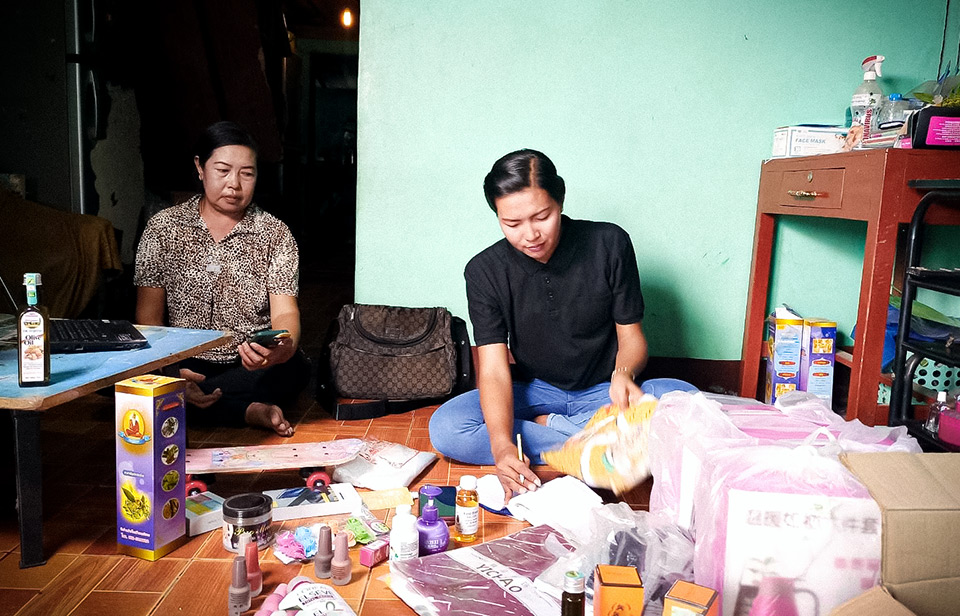Zin Hnin Phyu’s story: A returned woman migrant’s online business in Myanmar
Date:
Author: Augustus Anonuevo

Zin Hnin Phyu never thought she would be setting up an online shop when she got home to Myanmar. She worked in a shoe factory in Bangkok for two years and had no experience of business or online work. But she has always had it in her to pursue her dreams whatever it takes, as a woman, a migrant and a returnee.
Upon her return to Myanmar in 2019, she invested her savings of MMK 200,000 (USD 122) in her online business. “Doing business was not really in my plan while I was in Thailand,” she said. “But I knew that I am good at using phones and social media. I knew the area and some people. When I returned to Myanmar, I felt certain I could start my online shop. I am still young and can get around easily to take orders to customers, especially with my motorbike,” she said.
Starting her business was not easy. Hnin Phyu did not have many contacts on Facebook, and no experience in selling things online. There was poor internet connectivity where she lives. So she found a new internet provider. Then she explored Facebook and researched the market. “I learned how to create content for my products,” she said. “I asked my friends who are doing business online and learned from their ideas.”Hnin Phyu enthusiastically participated in the five-day Start and Improve Your Business Training conducted by Myanmar Green Conservation Organization (MGCO) in partnership with Foundation for Education and Development (FED), an organization enhancing the empowerment and well-being of returned migrant workers in Myanmar.
The training was part of an economic empowerment programme for returned women migrant workers in Cambodia, Lao People’s Democratic Republic and Myanmar, which is led by Atikha Overseas Workers and Communities Initiative, in partnership with UN Women.
The programme builds capacity of local non-governmental organizations to provide reintegration support for returned women migrants. This support includes reintegration counselling as well as entrepreneurship training and business mentoring to start or scale up their businesses. This initiative was implemented under the PROMISE project (Poverty Reduction through Safe Migration, Skills Development and Enhanced Job Placement in Cambodia, Lao People’s Democratic Republic, Myanmar and Thailand), and supported by the Swiss Agency for Development and Cooperation (SDC).
“Now more than ever, we see the importance of building the capacities of NGOs and other migration stakeholders to provide reintegration services to returned women migrant workers,” said Aileen Constantino-Peñas, Executive Director of Atikha and a trainer of the UN Women PROMISE project.
“Men and women face different circumstances when they return from migration,” said Nansiri Iamsuk, Programme Specialist of migration programme at UN Women Regional Office for Asia and the Pacific. “Frontline service providers must ensure that reintegration services are gender-responsive.”
Through the course, Hnin Phyu learned about financial management, profit, customer relations, and analysing strengths and weaknesses.
This has given her more confidence as a businesswoman. Before the training, her business made around MMK 300,000 profit a month. Now she has hired a worker and added more products. In addition to cosmetics, clothes, and seafood, she now sells frozen raw food like pork sticks and fish balls, and is making MMK 700,000 profit a month.
The training also taught Hnin Phyu to mitigate risks and challenges. “Sometimes a customer just cancels their order and this is really a problem,” she said. “I have to accept it and just connect to other customers and sell them the cancelled orders.”
It also reminded her to strike a happy balance between business and family obligations. “My business really helped my family, and my family has helped with my business,” she said. “My mother takes care of financial matters. My little sister takes charge of household matters and helps me attend to the needs of my child.”“I take care of orders, make food and communicate with customers and deliver what they ordered. But I also make sure that I spend time with my family. I guide my daughter in her studies and make sure that she remains good and disciplined. We find time to get out. We all are happy about our family arrangements.”Since the training, the political tensions in Myanmar have taken their toll on Hnin Phyu’s online business. She cannot deliver to areas where the military are clashing with resistance fighters, or anywhere at all after 6 pm. But she is continuing to serve her client base as best she can, and hope for the best - for herself, her business, her family and her country.“I have changed a lot,” she said. “Before, I just worked and spent what I earned.” Now, she says, the training has taught her to engage long-term, seek out opportunities, set achievable goals, and provide better for her family. “I am really happy about these changes in myself.”